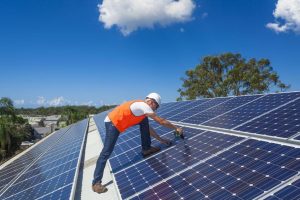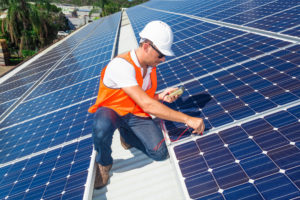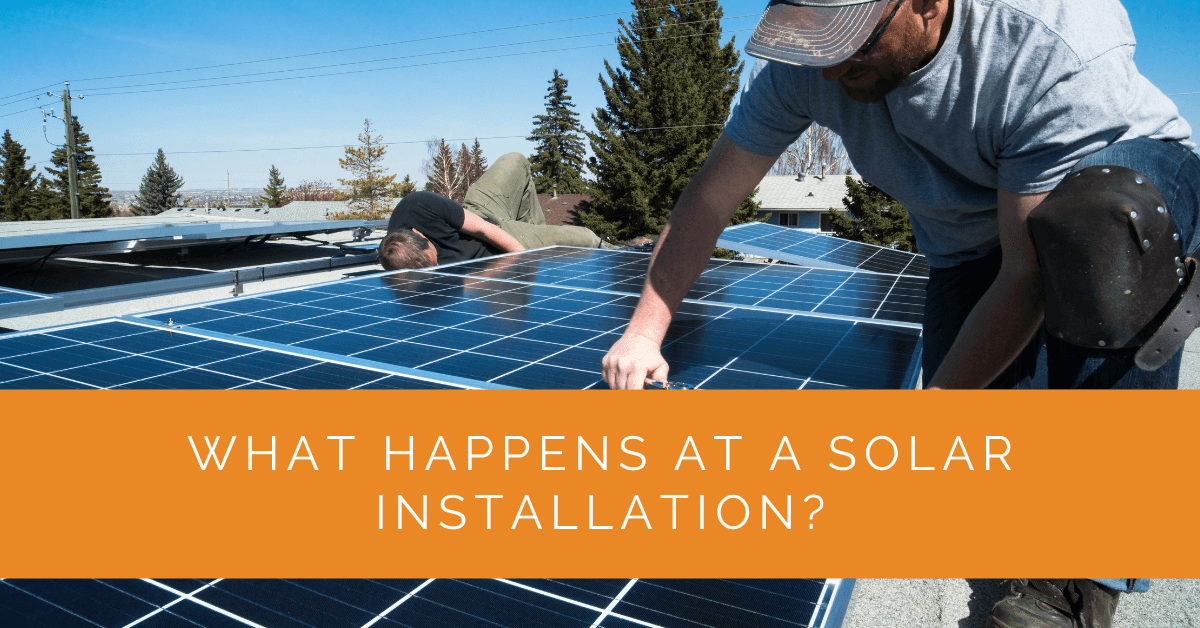The adoption of solar energy is rising as homeowners seek sustainable and cost-effective solutions to power their homes. If you’re considering going solar, it’s essential to understand the solar installation process and what to expect. In this article, we’ll guide you through the step-by-step journey of a solar installation, from assessing your property to the final system testing. So, let’s dive in!
Contents
- 1 Key Takeaways
- 2 Assessing Your Property for Solar Panel Installation
- 3 Customized Solar System Design
- 4 Obtaining Permits and Approvals
- 5 Preparing for Solar Panel Installation
- 6 Solar Panel Installation Process
- 7 System Testing and Commissioning
- 8 Education and Training for System Operation
- 9 Exploring Solar Panel Warranties
- 10 Case Study: A Successful Solar Installation Journey
- 11 Expert Insights From Our Solar Panel Installers About What Happens at a Solar Installation
- 12 Experience Solar Excellence with Us!
- 13 Conclusion
- 14 FAQ
Key Takeaways
- Assessing your property and customizing the solar system design are crucial steps in the solar installation process, ensuring optimal performance and maximum energy production.
- Obtaining permits, approvals, and thorough system testing and commissioning are essential for a smooth and successful solar installation.
- Understanding warranties and receiving education on system operation empower homeowners to make the most of their solar investment while embracing the benefits of renewable solar energy.
Assessing Your Property for Solar Panel Installation
Before the solar installation process begins, a reputable solar company will conduct an initial consultation and perform a thorough site assessment of your property. During the assessment, the installer will evaluate various factors to determine the feasibility and design of your solar panel system.
The installer will consider your roof orientation, shading analysis, available space, and the optimal placement of solar panels. This assessment is crucial for designing an efficient and effective solar system that maximizes energy production. By customizing the design based on your specific requirements, the installer ensures that your solar panel system will provide maximum benefits for years.
Customized Solar System Design
Once the assessment is complete, the solar installer will design a customized solar system for your property. This design involves determining the number of solar panels needed, their placement, and the electrical connections required. The installer will also factor in the wiring and inverter specifications to ensure seamless integration with your existing electrical system.
By tailoring the design to your specific energy needs, the solar system can generate the maximum amount of clean, renewable energy for your home. The installer will utilize advanced software and tools to optimize the system’s performance, considering local weather patterns, energy consumption patterns, and the available solar resource.
Obtaining Permits and Approvals
Before the installation can begin, obtaining the necessary permits and approvals from the relevant authorities is essential. Solar installers are experienced in navigating the permitting process and can handle the paperwork on your behalf. They are well-versed in local regulations and building codes, ensuring compliance throughout the installation process.
By entrusting the permit and approval process to the solar installer, you can rest assured that all the requirements are met, saving you time and ensuring a smooth installation.

Preparing for Solar Panel Installation
With permits in hand, the solar installation team will schedule a date for the installation process to commence. Before the team arrives, it’s essential to ensure that the installation area is clear and accessible. If any adjustments to the roof structure are required, the installer will coordinate with you to make the necessary modifications.
Safety is a top priority during the installation process. The team will take necessary precautions to create a safe work environment and follow all relevant safety guidelines. They will also coordinate with you to minimize disruptions and ensure the installation proceeds smoothly.
Solar Panel Installation Process
The solar panel installation involves several key steps to bring your solar system to life. The installation team will start by securely mounting the solar panels on your roof or ground-mount system. They will position the panels optimally to capture maximum sunlight throughout the day.
Next, the team will carefully connect the solar panels using high-quality electrical wiring. This wiring ensures efficient electricity flow from the panels to the inverter, which converts the direct current (DC) produced by the panels into usable alternating current (AC) for your home’s electrical needs.
The team will follow industry best practices and adhere to safety standards throughout the installation process. They will verify proper grounding, inspect the system’s components, and ensure the electrical connections are secure and functioning as intended.
System Testing and Commissioning
Once the solar panels are installed, the system undergoes thorough testing and commissioning. This critical step ensures your solar panel system works optimally and meets the expected performance standards.
During the testing phase, the installation team will comprehensively check the electrical connections, system performance, and safety features. They will inspect the wiring, confirm proper system grounding, and ensure all components function as intended. Additionally, they may install a utility meter to measure the energy produced by your solar system.
By conducting meticulous testing and commissioning, the solar installer ensures that your solar panel system is ready to power your home efficiently and reliably for years.

Education and Training for System Operation
As a homeowner, it’s important to understand how your solar panel system operates and how to monitor its performance. The solar installation team will provide the necessary education and training to ensure you can make the most of your solar investment.
They will explain the system’s operation, including how the solar panels generate electricity from sunlight. They will also guide you through the monitoring process, allowing you to track your energy production and ensure everything functions correctly.
In addition, the installation team will provide information on any specific maintenance requirements and recommended cleaning practices. Regular maintenance, such as keeping the panels clean and checking for any signs of damage, will help maximize the longevity and performance of your solar system.
Exploring Solar Panel Warranties
Solar panels typically come with warranties that provide your investment peace of mind and protection. These warranties vary depending on the manufacturer and the solar installer. It’s important to understand the coverage and duration of the warranties associated with your solar panel system.
Manufacturers typically offer warranties for the panels, ensuring they perform reliably for a specified period. Solar installers often provide installation warranties that cover their workmanship and ensure the proper installation of the panels and related components.
Reviewing and understanding the warranty terms for your solar panel system is recommended. In case of any issues or concerns, you can contact the manufacturer or the solar installer for assistance.
Case Study: A Successful Solar Installation Journey
Background
At Solar Panels Network USA, we pride ourselves on delivering seamless solar installations tailored to our clients’ unique needs. This case study showcases the journey of a homeowner who transitioned to solar energy, highlighting each step of the installation process and the benefits they experienced.
Project Overview
Our client, a homeowner interested in reducing their electricity bills and embracing renewable energy, approached us for a comprehensive solar installation. The goal was to design and install a solar panel system that would maximize energy production and provide long-term financial and environmental benefits.
Implementation
Initial Consultation and Property Assessment
We began with an initial consultation to understand the homeowner’s energy needs and expectations. Our team conducted a thorough site assessment, evaluating roof orientation, shading, and available space. Using advanced tools, we analyzed the optimal placement for solar panels to ensure maximum sunlight exposure throughout the day.
Customized Solar System Design
Based on the assessment, our engineers designed a customized solar system tailored to the property’s specifications. The design included the number of solar panels required, their placement, and the necessary electrical connections. We used advanced software to optimize the system’s performance, considering local weather patterns and energy consumption trends.
Permits and Approvals
Our team handled the entire permitting process, securing the necessary approvals from local authorities. We ensured that the design complied with all building codes and regulations, facilitating a smooth and hassle-free installation.
Preparation and Installation
With permits in hand, we scheduled the installation date. Before the installation team arrived, the homeowner cleared the installation area to ensure accessibility. Our team took all necessary safety precautions, following industry best practices to create a safe work environment.
The installation began with securely mounting the solar panels on the roof. We positioned the panels to capture maximum sunlight and connected them using high-quality electrical wiring. The inverter was installed to convert the direct current (DC) from the panels into alternating current (AC) for household use.
System Testing and Commissioning
After installation, we conducted thorough system testing and commissioning. This included checking electrical connections, verifying system grounding, and ensuring all components functioned as intended. We installed a utility meter to measure the energy produced by the solar system and confirm its efficiency.
Education and Training
To ensure the homeowner could maximize their solar investment, we provided comprehensive education and training. We explained the system’s operation, monitoring processes, and maintenance practices. The homeowner learned how to track energy production and handle basic maintenance tasks to keep the system running optimally.
Results
Optimal System Performance
The customized solar system performed exceptionally well, generating ample electricity to meet the homeowner’s energy needs. The thorough site assessment and design optimization ensured maximum energy production.
Financial and Environmental Benefits
The homeowner experienced immediate reductions in electricity bills, benefiting from the clean, renewable energy generated by the solar panels. The transition to solar power also contributed to reducing their carbon footprint, aligning with their environmental goals.
Long-Term Investment Security
With a comprehensive understanding of their solar system’s operation and maintenance, the homeowner felt confident in their investment. The warranties provided additional peace of mind, ensuring long-term protection and reliability.
Summary
This case study illustrates the detailed and professional approach Solar Panels Network USA takes in each solar installation project. From the initial consultation and property assessment to the final system testing and education, every step is meticulously planned and executed. Our commitment to quality and customer satisfaction ensures that homeowners can enjoy the financial and environmental benefits of solar energy for years to come.
Expert Insights From Our Solar Panel Installers About What Happens at a Solar Installation
Assessing your property is the first crucial step in the solar installation process. A thorough site assessment ensures that the solar system design is customized for optimal performance, considering factors like roof orientation and shading.
Senior Solar Installer
Obtaining the necessary permits and approvals can be complex, but it’s an essential part of ensuring compliance with local regulations. Our team handles all the paperwork, so you can have peace of mind and a smooth installation process.
Lead Solar Technician
System testing and commissioning are vital to ensure your solar panel system operates efficiently. We conduct comprehensive checks and provide training on system operation to empower homeowners to maximize their solar investment.
Solar Energy Consultant
Experience Solar Excellence with Us!
Trust in Solar Panels Network USA, where our seasoned experts deliver top-quality solar solutions for homes and businesses nationwide. With a legacy of countless successful installations and a commitment to sustainable energy, we’re your reliable partner in the solar journey. Ready for a brighter, eco-friendly future? Call us now at (855) 427-0058 and harness the power of the sun!
Conclusion
Embarking on a solar installation journey is an exciting step towards harnessing the sun’s power to power your home sustainably. By understanding the solar installation process, from assessing your property to the final system testing, you can make informed decisions and have confidence in your solar investment.
Remember, working with a reputable solar company and a professional installation team is crucial to ensure a successful and hassle-free installation. Going solar helps reduce your reliance on the utility company, lowers your electric bill, and contributes to a greener and more sustainable future.
So, leap and embrace the power of solar energy today. Experience the numerous benefits of a well-designed and professionally installed solar panel system, and enjoy the financial savings and environmental impact it brings to your home.
FAQ
What to expect when installing solar?
Installing solar involves several key steps, including initial consultation and site assessment. The solar installer will design a customized solar system based on your property’s specifications. After obtaining permits and approvals, the installation team will mount the panels, connect the wiring, and perform system testing before commissioning the solar system.
What are the procedures for solar installation?
The procedures of solar installation typically include:
- Initial consultation and site assessment to evaluate your property’s solar potential.
- Customized solar system design, considering factors like panel placement and electrical connections.
- Obtaining necessary permits and approvals.
- Preparing for installation by ensuring the installation area is clear and accessible.
- Installing the solar panels, connecting the wiring, and verifying system functionality.
- Thorough testing and commissioning of the solar system to ensure optimal performance.
How do I prepare for solar installation?
To prepare for solar installation, consider the following:
- Clear the installation area and ensure it is accessible to the installation team.
- Discuss any necessary roof modifications with the solar installer, if applicable.
- Coordinate with the installer to minimize disruptions during the installation process.
- Familiarize yourself with the installation timeline provided by the solar company.
- Ask any additional questions or concerns you may have before the installation begins.
What to do after solar panels are installed?
After solar panels are installed, there are a few steps to take:
- Familiarize yourself with your solar panel system and its operation.
- Monitor the system’s performance and energy production regularly.
- Follow any recommended maintenance practices provided by the solar installer.
- Understand the warranty coverage for your solar panels and contact the manufacturer or installer for any issues.
- Enjoy the benefits of clean, renewable energy and the financial savings it brings.
Remember, consulting with your solar installer and following their guidance will ensure a smooth transition to solar energy and help you maximize your solar investment.
About the Author
Solar Panels Network USA stands at the forefront of solar energy solutions, driven by a team of seasoned solar engineers and energy consultants. With over decades of experience in delivering high-quality solar installations and maintenance, we are committed to promoting sustainable energy through customer-centric, tailored solutions. Our articles reflect this commitment, crafted collaboratively by experts to provide accurate, up-to-date insights into solar technology, ensuring our readers are well-informed and empowered in their solar energy decisions.

